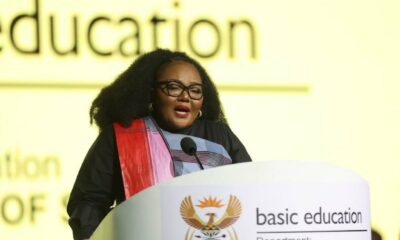News
Gwarube’s R35 Billion Vision: Can This Budget Rebuild SA’s Broken Education System?

A bold education budget, a country of hopeful builders, but will it be enough to fix what’s broken?
When Siviwe Gwarube stood before Parliament this week to deliver her first education budget as minister, she didn’t mince her words. “In every generation, a choice must be made, to be a builder or a breaker,” she said, laying out a R35.2 billion plan to fix South Africa’s basic education system.
And she’s right. Because right now, the system is cracking under the weight of old problems: ghost workers, pit toilets, underqualified teachers, and schools with no books or meals. Can this budget, nearly 9% bigger than last year’s, really turn things around?
Let’s break it down.
A Shift Toward Building, Not Blaming
Minister Gwarube made it clear, this is not a budget for flashy projects or political theatrics. “This budget is for the builders,” she said. The ones willing to do the unglamorous work: fill vacant teaching posts, fix toilets, and feed hungry learners.
This year’s education budget is built around five priorities:
-
Foundational literacy and numeracy
-
Inclusive education
-
Teacher development
-
Safe, functioning schools
-
Expanding Early Childhood Development (ECD)
She reminded MPs that South Africa has spent years plugging financial holes in broken SOEs instead of investing in its future, its children. And now, education departments in provinces like KwaZulu-Natal are in financial crisis, some unable to pay school allocations or fund support services.
Fixing Foundations: Starting at Grade R
There’s a clear push to fix the system from the bottom up. That means starting with Grade R. The department will increase funding for the Early Childhood Development grant to over R1.7 billion. Another R230 million is going to a nutrition pilot for ECD learners, with R162 million tagged for new infrastructure.
“Every child must enter Grade R ready to learn in all respects,” said Gwarube. That includes being fed, safe, and supported.
A Push for Literacy, in Every Language
Perhaps the most quietly revolutionary part of this budget? Language. R57 million has been allocated to roll out mother-tongue-based bilingual education, a move praised by academics and community leaders who say many learners are failing simply because they don’t understand the language of instruction.
It’s a move that could have massive long-term benefits, especially in rural and township schools where learners often have to make the linguistic leap to English without support.
Teachers: Still Undervalued, but Finally Funded
Gwarube made a point to say what educators have been screaming for years: you can’t fix education without fixing teaching. Over R1.8 billion is being invested in teacher mentorship, training, and leadership programmes.
She also promised to audit all professional development offerings to ensure teachers aren’t wasting time on box-ticking workshops.
And with the national catalogue for Grades 1-3 being updated by 2026, teachers may soon have better curriculum-aligned materials at their fingertips.
Safety, Toilets, and Classrooms: Reality Checks in the Budget
No South African budget speech would be complete without confronting one of our national shames: pit toilets. The R15.3 billion Education Infrastructure Grant will help provinces eliminate these death traps, expand overcrowded classrooms, and repair collapsing buildings.
Meanwhile, R10 billion will go toward the National School Nutrition Programme, which feeds over 9 million learners a day, a lifeline for many children who arrive at school hungry.
Mixed Reaction: Applause and Caution
Matakanya Matakanye, head of the National Association of School Governing Bodies, cautiously welcomed the budget but said it didn’t go far enough, especially for poor and rural schools. “We had hoped this would directly deal with the inequalities we see every day,” he said.
On social media, the response was similarly mixed. Some praised Gwarube’s “builder” approach and welcomed her no-nonsense tone. Others questioned whether the budget would trickle down past provincial mismanagement, especially where ghost employees and misused funds have previously crippled schools.
Will Provinces Deliver?
Gwarube has demanded provinces submit “credible” financial recovery plans by July. That includes fixing issues like vacant posts, non-compliance with funding norms, and ghost workers draining the system.
If they don’t? The minister warned she will not hesitate to escalate failures using tools under the National Education Policy Act and even involve Parliament.
Budget Alone Won’t Save the Sector
R35 billion is a serious amount. But in a country where millions of children still learn in broken classrooms without books or breakfast, it’s not just about how much is spent it’s about how.
Minister Gwarube’s rhetoric of builders vs breakers is stirring, and her goals are bold. But without discipline, oversight, and public accountability, even the best-laid budgets will collapse like too many school ceilings before them.
Let’s hope, this time, the builders win.
{Source: IOL}
Follow Joburg ETC on Facebook, Twitter , TikTok and Instagram
For more News in Johannesburg, visit joburgetc.com


























